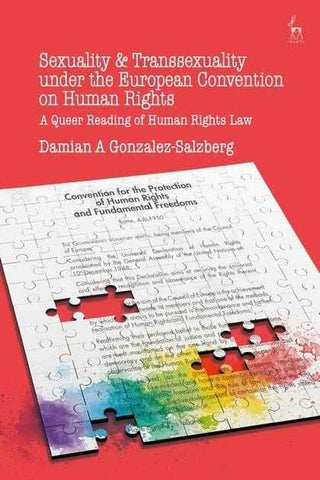Sexuality and Transsexuality under the European Convention on Human Rights : A Queer Reading of Human Rights Law
- Unit price
- / per
-
Author:GONZALEZ SALZBERG Damian
-
ISBN:9781509914937
-
Publication Date:February 2019
-
Edition:1
-
Pages:248
-
Binding:Hardback
-
Publisher:Hart Publishing - Oxford
-
Country of Publication:


A Back Order button means that we don’t have the book in stock at our store. It may already be on order – or we can order it for you from a publisher or distributor at no additional cost.
As we source items from around the globe, a back-order can take anywhere from 5 days to several weeks to arrive, depending on the title.
To check how long this might take, you’re welcome to contact us and we can provide an ETA or any other information you need. We recommend checking the timeframe before committing to an online order.
Sexuality and Transsexuality under the European Convention on Human Rights : A Queer Reading of Human Rights Law
- Unit price
- / per
-
Author:GONZALEZ SALZBERG Damian
-
ISBN:9781509914937
-
Publication Date:February 2019
-
Edition:1
-
Pages:248
-
Binding:Hardback
-
Publisher:Hart Publishing - Oxford
-
Country of Publication:
Description
This book undertakes a critical analysis of international human rights law through the lens of queer theory. It pursues two main aims: first, to make use of queer theory to illustrate that the field of human rights law is underpinned by several assumptions that determine a conception of the subject that is gendered and sexual in specific ways. This gives rise to multiple legal and social consequences, some of which challenge the very idea of universality of human rights. Second, the book proposes that human rights law can actually benefit from a better understanding of queer critiques, since queer insights can help it to overcome heteronormative beliefs currently held. In order to achieve these main aims, the book focuses on the case law of the European Court of Human Rights, the leading legal authority in the field of international human rights law. The use of queer theory as the theoretical approach for these tasks serves to deconstruct several aspects of the Court's jurisprudence dealing with gender, sexuality, and kinship, to later suggest potential paths to reconstruct such features in a queer(er) and more universal manner.
Featured in the June 2019 Law newsletter.
To receive this newsletter regularly please email us with your name and contact details.
Adding product to your cart
You may also like
A Back Order button means that we don’t have the book in stock at our store. It may already be on order – or we can order it for you from a publisher or distributor at no additional cost.
As we source items from around the globe, a back-order can take anywhere from 5 days to several weeks to arrive, depending on the title.
To check how long this might take, you’re welcome to contact us and we can provide an ETA or any other information you need. We recommend checking the timeframe before committing to an online order.
You may also like
You may also like
-
This book undertakes a critical analysis of international human rights law through the lens of queer theory. It pursues two main aims: first, to make use of queer theory to illustrate that the field of human rights law is underpinned by several assumptions that determine a conception of the subject that is gendered and sexual in specific ways. This gives rise to multiple legal and social consequences, some of which challenge the very idea of universality of human rights. Second, the book proposes that human rights law can actually benefit from a better understanding of queer critiques, since queer insights can help it to overcome heteronormative beliefs currently held. In order to achieve these main aims, the book focuses on the case law of the European Court of Human Rights, the leading legal authority in the field of international human rights law. The use of queer theory as the theoretical approach for these tasks serves to deconstruct several aspects of the Court's jurisprudence dealing with gender, sexuality, and kinship, to later suggest potential paths to reconstruct such features in a queer(er) and more universal manner.
Featured in the June 2019 Law newsletter.
To receive this newsletter regularly please email us with your name and contact details. -
-
Author: GONZALEZ SALZBERG DamianISBN: 9781509914937Publication Date: February 2019Edition: 1Pages: 248Binding: HardbackPublisher: Hart Publishing - OxfordCountry of Publication:
This book undertakes a critical analysis of international human rights law through the lens of queer theory. It pursues two main aims: first, to make use of queer theory to illustrate that the field of human rights law is underpinned by several assumptions that determine a conception of the subject that is gendered and sexual in specific ways. This gives rise to multiple legal and social consequences, some of which challenge the very idea of universality of human rights. Second, the book proposes that human rights law can actually benefit from a better understanding of queer critiques, since queer insights can help it to overcome heteronormative beliefs currently held. In order to achieve these main aims, the book focuses on the case law of the European Court of Human Rights, the leading legal authority in the field of international human rights law. The use of queer theory as the theoretical approach for these tasks serves to deconstruct several aspects of the Court's jurisprudence dealing with gender, sexuality, and kinship, to later suggest potential paths to reconstruct such features in a queer(er) and more universal manner.
Featured in the June 2019 Law newsletter.
To receive this newsletter regularly please email us with your name and contact details.-
Author: GONZALEZ SALZBERG DamianISBN: 9781509914937Publication Date: February 2019Edition: 1Pages: 248Binding: HardbackPublisher: Hart Publishing - OxfordCountry of Publication:
-




